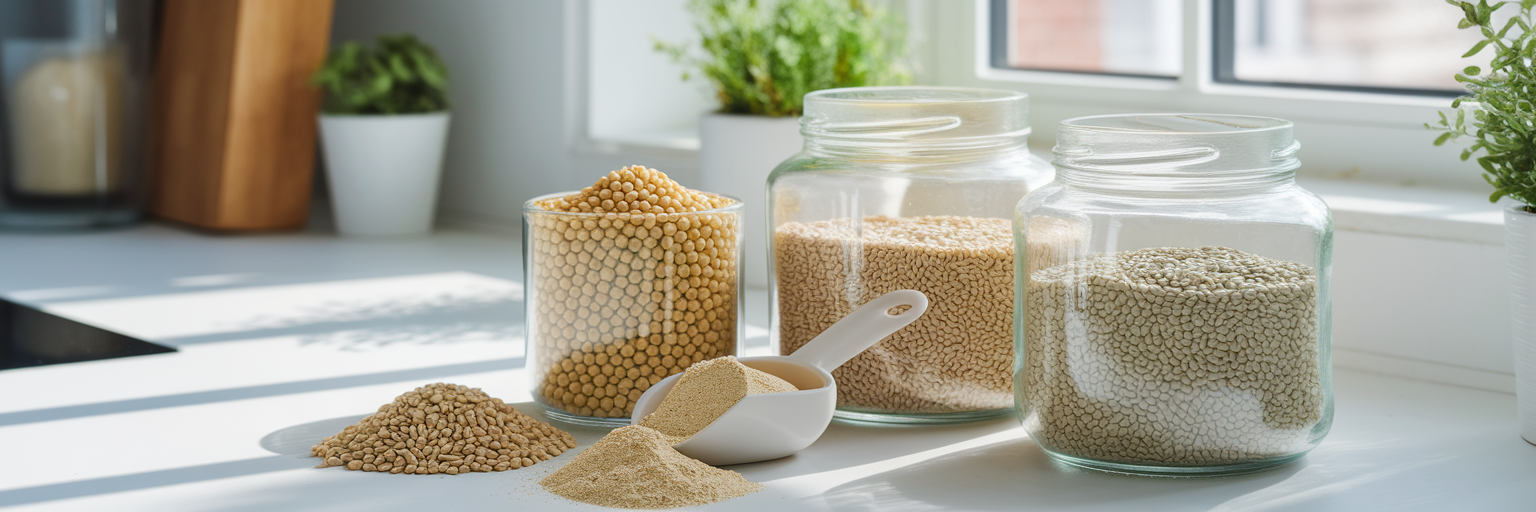Why Your Post-Workout Routine Matters
We all know that feeling. The one that hits right after a challenging workout, a mix of total exhaustion and deep satisfaction. It’s the quiet signal that you’ve pushed your limits. But what happens next is where your progress is truly made. The post-workout phase isn’t just about cooling down; it’s the critical window where your body begins to repair and rebuild, turning all that effort into tangible strength.
Think of muscle recovery as your body's dedicated repair cycle. During intense exercise, your muscle fibers experience tiny tears. This is a good thing—it’s the stimulus for growth. However, this repair process requires fuel, and the most important nutrient for the job is protein. It provides the raw materials needed to mend those fibers, making them stronger and more resilient than before.
For years, the fitness community in the US pointed to one primary source for this fuel. But now, there's a significant shift happening. Athletes and fitness enthusiasts are discovering that plant-based proteins aren't just an alternative; they are a premier choice for effective recovery. These thoughtful formulations offer everything your body needs to bounce back faster. Following a few simple post workout recovery tips, starting with your protein choice, can make all the difference.
The Building Blocks of Muscle Recovery

To understand why protein is so essential, it helps to look at what’s happening inside your muscles when you train. It’s less complicated than it sounds and explains exactly why your post-workout nutrition is so important.
What Happens to Your Muscles During Exercise
Imagine your muscle fibers are like tightly woven ropes. A high-intensity workout, whether it's lifting weights or sprinting, puts stress on these ropes, causing microscopic frays and tears. This process, known as exercise-induced muscle damage, is the trigger that tells your body it’s time to adapt and get stronger.
Amino Acids: The Repair Crew
This is where your body’s “repair crew” comes in: amino acids. They are the building blocks of protein. When you consume protein, your body breaks it down into these individual amino acids and sends them to your muscles to patch up the damage. Some of these, called essential amino acids, must come from your diet because your body can't produce them. This is why a protein-rich shake after a workout is so effective—it’s a direct delivery of repair materials.
The Power of BCAAs, Especially Leucine
Among the essential amino acids, three are particularly important for muscle repair. These are the Branched-Chain Amino Acids (BCAAs):
- Leucine: The most critical of the three. Think of it as the foreman of the construction site, giving the signal to start the rebuilding process.
- Isoleucine: Helps with energy uptake into the muscle cells.
- Valine: Supports energy and muscle coordination.
Leucine is the star player because it directly activates a process called Muscle Protein Synthesis (MPS), which is the engine that drives muscle growth and repair. Without enough leucine, the repair process is less efficient. Modern vegan protein powders are specifically formulated to provide the best amino acids for recovery, ensuring they contain high levels of leucine to effectively kickstart the repair process. Finding a well-formulated powder is key, and for those curious about what makes a great one, you can explore some of the best protein powders we've reviewed on our blog.
Plant-Based Protein's Edge in Recovery
The conversation around vegan vs whey protein for athletes has changed dramatically. The old myth that plant proteins are "incomplete" or inferior for muscle building is being replaced by a clearer understanding of their unique advantages, especially for recovery.
It’s true that a single plant source might not have all essential amino acids in optimal amounts. However, high-quality vegan protein powders solve this by blending complementary sources, like pea and rice protein. This combination creates a robust and complete amino acid profile that stands shoulder-to-shoulder with whey. In fact, as research available on PubMed confirms, when total protein intake and leucine content are matched, plant-based proteins stimulate muscle protein synthesis just as effectively as whey.
But plant protein offers more than just comparable muscle-building power. One of its biggest advantages is digestibility. Many people in the US experience bloating, gas, or discomfort from whey protein due to its lactose content. A high-quality vegan protein blend like ours is naturally lactose-free, making it a gentler, bloat-free option that your body can absorb easily. It’s also often free of common allergens like dairy and soy, making it a cleaner choice for sensitive systems.
| Feature | High-Quality Vegan Protein (Blend) | Whey Protein (Concentrate/Isolate) |
|---|---|---|
| Amino Acid Profile | Complete profile achieved through blending (e.g., pea + rice) | Naturally complete profile |
| Digestibility | Generally easier to digest, free of lactose | Can cause bloating or discomfort for those with lactose sensitivity |
| Allergen Content | Free from common allergens like dairy and soy (depending on source) | Contains dairy, a common allergen |
| Added Nutrients | Rich in fiber, antioxidants, and phytonutrients | Primarily protein; lacks fiber and has fewer micronutrients |
Note: This table compares general characteristics. Individual product formulations can vary. The key takeaway is that modern vegan blends offer a comparable amino acid profile with added digestive and nutritional benefits.
The Golden Hour for Protein Intake

You’ve finished your last set and are heading to the locker room. What you do in the next 30 to 60 minutes can significantly impact your recovery and results. This period is often called the "anabolic window," a time when your muscles are primed for nutrient absorption.
Think of your muscle cells like sponges right after a workout. They have used up their energy stores and are incredibly receptive to nutrients that can help them repair and refuel. Consuming a fast-digesting protein source during this window delivers amino acids to your muscles exactly when they need them most, kickstarting the repair process immediately.
Taking a plant based protein after workout not only supports muscle growth but also helps reduce Delayed Onset Muscle Soreness (DOMS). That’s the muscle ache you feel a day or two after a tough session. By fueling your recovery promptly, you can lessen that soreness and get back to your training routine with more consistency. Here are a few practical post workout recovery tips to make it happen:
- Prep your shake ahead of time. Mix your powder with water or plant-based milk in a shaker bottle before you even leave for the gym.
- Keep a pre-portioned scoop ready. Have a scoop of protein powder waiting in a clean, dry shaker at home or in your gym bag so you can just add liquid and go.
- Blend it into a smoothie. If you have a few extra minutes, blending your protein with a banana can also help replenish your glycogen stores. For more ideas, check out these easy vegan protein recipes you’ll actually crave.
Beyond Muscle Repair: Added Wellness Benefits
While muscle repair is the main event, the benefits of choosing a vegan protein for muscle recovery extend to your overall wellness. Intense exercise, while beneficial, also creates inflammation and oxidative stress in the body. This is a natural part of the process, but managing it is key to a smooth recovery.
This is where plant-based proteins offer a unique advantage. They are naturally rich in antioxidants and phytonutrients, which are compounds found in plants that help combat inflammation. A 2024 study highlighted in the journal Nutrients showed how certain plant-derived compounds can aid in reducing exercise-induced inflammation, helping your body bounce back more effectively.
Another often-overlooked benefit is dietary fiber. Plant protein sources contain fiber, whereas whey protein contains none. Fiber is crucial for a healthy gut microbiome, which plays a vital role in everything from nutrient absorption to immune function. A healthy gut ensures you are getting the maximum benefit from all the nutrients you consume, which is essential for any athlete. By choosing a plant-based protein, you are not just feeding your muscles; you are supporting your entire system's resilience. For more insights on holistic health, you can always visit our blog.
Choosing a High-Quality Vegan Protein

With so many options on the shelf, picking the right vegan protein can feel overwhelming. However, knowing what to look for on the label makes it much simpler. Here’s a quick guide to help you make an informed choice and ensure you’re getting a product that truly supports your recovery.
- Look for a complete amino acid profile. The label should indicate that it’s a "complete protein." This is usually achieved with a blend of different plant sources, like pea and brown rice protein, which together provide all the essential amino acids your muscles need.
- Check the leucine content. As we discussed, leucine is the key that starts muscle protein synthesis. A high-quality powder will typically provide at least 2.5 grams of leucine per serving. This information is often highlighted by top brands.
- Read the ingredient list. The best vegan proteins have a clean, simple ingredient list. Watch out for hidden sugars, artificial sweeteners, fillers, and gums, as these can cause digestive upset and work against your recovery goals.
- Seek out third-party certifications. For athletes, certifications like NSF Certified for Sport or Informed-Sport are a mark of quality. They guarantee that the product is free from banned substances and that what’s on the label is what’s in the bottle.
By keeping these points in mind, you can confidently choose a vegan protein powder that is pure, effective, and aligned with your health goals.
Integrate Vegan Protein into Your Fitness Journey
Making the switch to a plant-based protein is a simple but powerful step toward enhancing your fitness results. As we've seen, a well-formulated vegan protein offers a complete amino acid profile for effective muscle repair, is best consumed within the post-workout window, and provides added wellness benefits like anti-inflammatory support.
Incorporating it into your routine is an easy adjustment that can lead to faster recovery, less soreness, and better overall performance. You’re not just building muscle; you’re investing in a more holistic approach to your health.
Ready to feel the difference in your recovery? Explore our range of high-quality vegan proteins and find the perfect blend for your goals.
Found this helpful? Share it with a workout buddy who needs to upgrade their recovery game!



